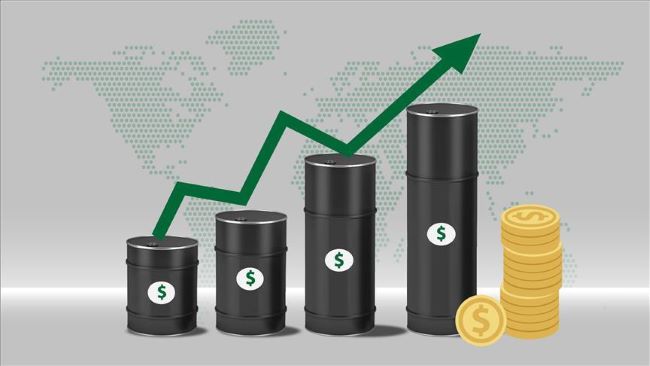Due of ongoing tensions between Israel and Hamas, experts have begun predicting that global oil prices may reach $100 per barrel under Middle Eastern pressures. If Israel continues to harm civilians, there is a broad anticipation that the war will expand to other nations in the area.
The price of Brent crude rose above $92 a barrel on Friday, increasing for a second consecutive week, as the Middle East conflict between Israel and Hamas raises supply concerns for the global oil market.
After the Islamist organization Hamas freed two American prisoners from Gaza, oil prices declined from $90 for the most of the week, but concerns of a Middle Eastern conflict still exist.
Before a jump in demand from China and the US drove up the price of Brent, the price had fallen below $86 a barrel. The tightened oil cartel output volume was overshadowed by the forecast for increasing demand, which caused the price curve for key oil grades to go upward.
Although Israel’s conflict against Hamas is still going on, West Texas Intermediate (WTI) crude oil fell off early gains and finished down for the first time in three sessions.
The price of WTI crude oil for November delivery decreased by US$0.62 to US$88.75 a barrel, while the price of December Brent crude, the industry standard, decreased by US$0.22 to US$92.16. As a result of US pressure, Israel agreed to postpone a ground invasion of Gaza, which led to the decline.
Still, the country’s war against Hamas is raising tensions in the wider Middle East, with Iranian-backed militias fighting Israeli forces at the Israel-Lebanon border, while a US naval destroyer on Thursday shot down missiles fired from Yemen.
Rising tensions come as supplies remain tight following OPEC+ quota reductions and Saudi Arabia’s one million barrel per day voluntary production cut.
The US President Joe Biden Administration lifted some sanctions on Venezuela in order to return some supply from the country with the world’s largest reserves after it agreed to freer elections, though it is likely to have limited impact.
“Treasury issued a six-month license that authorizes transactions in Venezuela’s oil sector, noting that the sanctions are designed to snap back if election progress is not made. While there have been some headlines forecasting a large resurgence of Venezuelan crude, market expectations are an incremental 200-300 kb/d,” Helima Croft, Head of Global Commodity Strategy and MENA Research at RBC Capital Markets, said in a note.
Lately, oil prices have been supported by expectations of a wider market deficit in the fourth quarter after top producers Saudi Arabia and Russia extended supply cuts to the end of the year. Elsewhere, the US is also planning to buy 6 million barrels of crude for delivery in December and January to replenish strategic reserves.
The US government broadly eased sanctions on the Venezuelan oil sector following a deal between Washington and Caracas that promotes fairness in the upcoming Venezuelan elections.
Market players are attempting to gauge the potential impact of the violence, which began on Oct. 7, as well as the effect it will have on crude oil supply lines as the crisis escalates.
During the week, oil prices surged to $93 a barrel over Iran’s call for an oil embargo on Israel following an Israeli airstrike on the Al-Ahli Baptist Hospital in Gaza, which killed more than 500 people late Tuesday.
Meanwhile, fears of a breakdown in the normalization process between Saudi Arabia and Israel, both of which do not have formal diplomatic relations, also lent support to oil price rises.
Supporting further price increases and strong demand, the Energy Information Administration (EIA) on Thursday revealed a drop in oil inventories of 4.5 million barrels per day to 419.7 million barrels, compared to the American Petroleum Institute’s expectation of a drawdown of around 4.4 million barrels.
Oil prices further spiked on Friday with the US announcement that it would replenish its Strategic Petroleum Reserves (SPR) by adding a total of 6 million barrels to its SPR between December 2023 and January 2024 due to the escalating geopolitical tensions in the Middle East.
Moreover, the weakening dollar as a result of US Federal Reserve Chair Jerome Powell’s remarks on Thursday, in which he said that lower economic growth is required to curtail high inflation, also put upward pressure on oil prices.
On Wednesday, the US decided to partially ease sanctions on the oil, gas and gold sectors in Venezuela following the resumption of talks between the government and the country’s opposition in Barbados.
The decision by the US administration came in response to a political agreement signed between representatives of the government of Nicolas Maduro and the US-backed opposition to hold elections next year.
Oil prices dropped on Thursday on reports of the lifting of sanctions on Venezuela’s oil exports, easing tight supply fears. However, investor caution amid the escalating tension in the Middle East and data signalling a rebound in China’s economy capped price declines.
Market sentiment was boosted after data showed that China’s value-added industrial output, an important economic indicator, rose 4% year on year in the first three quarters of this year.
MTN Nigeria To Sponsor 29th Nigerian Economic Summit (NES)












